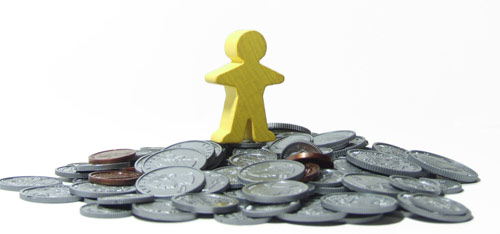One of the things I remember growing up was that my parents tried to teach me financial independence. While they helped pay for extracurricular activities, and provided for my needs, I was also expected to save up for various items related to my own entertainment. If I wanted to go to a concert, or if I wanted to go out with my friends, I had to use my own money.
My parents also made it clear that I wouldn't get a free ride, should I decide to move back into the house after I left at age 18. When my sister moved back in with her family for a few months, the ground rules were clear: You need to have a job, or be attending school. You need to be trying to improve your situation, or you're out. They didn't charge rent, but they did expect financial progress to be made, and my sister's family moved out after getting back on their feet.
It's true that my parents have sacrificed for us, but they're not about to let us ruin their financial future, and the emphasis has always been on getting us to a point at which we could fend for ourselves financially. At some point, it makes sense to send your kids out there to provide for themselves. And, of course, those lessons start at home.

Make Kids Responsible For Their Money Choices
While you can't expect a 10 year old to pay rent, or cover all of his or her clothing costs, you can help your child understand how to manage money. Let your child have money of his or her own to manage. This includes putting money away in a savings account (my son thinks it's fun to head to the bank and earn prizes for reaching certain milestones), donating to charity, and making spending decisions. My son has made mistakes, since we have, in the past, let him buy stupid things that he's regretted. Better he learn about making good decisions now, with the small stuff, than learning the hard way later. As a result of being allowed to make money mistakes, my son is already more thoughtful about what he does with the money he controls.
Teach More Complex Concepts As Kids Age
Starting out with an allowance, or with a way for children to earn their money, is a good way to begin teaching financial fundamentals. As kids age, you can teach more complex lessons. Consider helping them invest, and let them borrow from you — with interest. Requiring your children to pay you back with interest is a valuable lesson they can learn about finances, and borrowing. My son borrowed money not too long ago, and his repayment schedule meant that he saw all of his allowance for four weeks (after his tithing and savings were taken out), go to repaying the debt. He hasn't borrowed since, especially now that he knows that repaying debt means you have to give back more than borrowed.
Hopefully, these lessons will help my son learn financial independence. Later, we'll start a Roth IRA with him when he starts working a “real” job. It will be a good thing for him to get an early start on financial freedom.
What do you do to teach your kids financial independence?
My children were on a budget in college and I think they learned a great deal from the experience. My children learned more from what my wife and I modeled for them than any particular financial lessons.
I love every one of these tips – nicely done Miranda! The Roth IRA is one of my favs. Based on some advice from Dan Kadlec several years ago, we create a “Family 401(k)” opportunity for each of our working teens where we do some very aggressive matching on their Roth IRA contributions as extra incentive.
The problem with a lot of kids is that they EXPECT their parents to handhold them and help them whenever they’re in financial trouble.
I totally agree about the advantages and benefits of teaching our kids to handle money at an early age. Still, there are many parents who find this hard to do since they would feel that they are being to hard on their children. It is the parents’ duty to train their children so they can stand on their own in the future. In the end, their children would understand and appreciate the lessons.